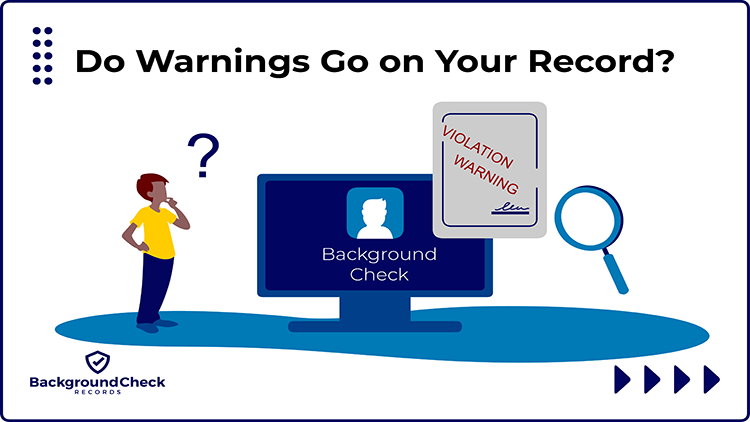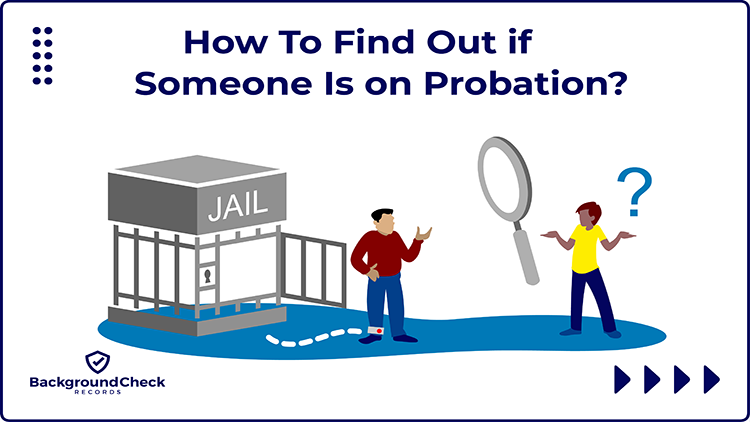We use cookies to ensure that we give you the best experience on our website. If you continue to use this site we will assume that you are happy with it.
Does Getting Fired Go on Your Record? Sometimes (See Reasons Why)
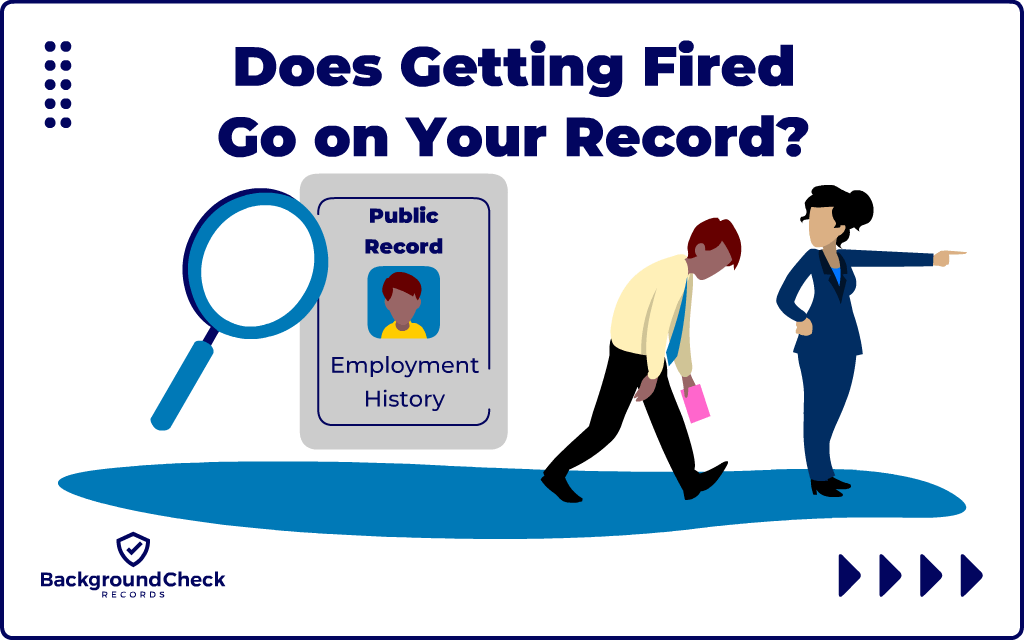
Table of Contents
The United States Department of Labor noted 1.4 million people experienced a layoff or involuntary separation in May 2022, sparking inquiries into whether being terminated affects your employment history.1 Regrettably, being fired can impact your professional background in certain instances, and there are multiple reasons why termination can pose challenges, although it doesn’t necessarily mean the end of one’s career.
Thus, it’s important to understand and see the reasons why termination can go on your record as well as acknowledge the fact that some employers simply check person’s employment history further than others.
Termination & Its Impact on Your Record
Looking for a new job after being fired can be daunting, especially if the applicant is concerned about the recent termination and its potential to show up on their record. But luckily it will only impact their next interview under certain circumstances.
Usually, the reason for separation from an employer is not part of a routine pre-screening check, but there are times it can come up during the overall screening process. How this information is shared by previous employers also depends on state employment laws.
Since termination typically does not appear on standard background checks, there is a possibility that a prospective employer may not discover it. However, this varies depending on the type of screening conducted, addressing whether being fired will be disclosed.
All states operate under “at-will” employment laws, allowing termination with or without cause. This doesn’t mean that people are fired just on a whim, there is usually a reason noted in the personnel file that can be presented if the person fired seeks unemployment benefits.
Currently, Montana is the only state that is not completely an “at-will” state.2 “At-will” means an employer can fire someone any time without a cause or reason as long as it doesn’t violate anti-discrimination laws or other legal protections. Montana’s Wrongful Discharge from Employment Act gives employees extra protection regarding terminations.
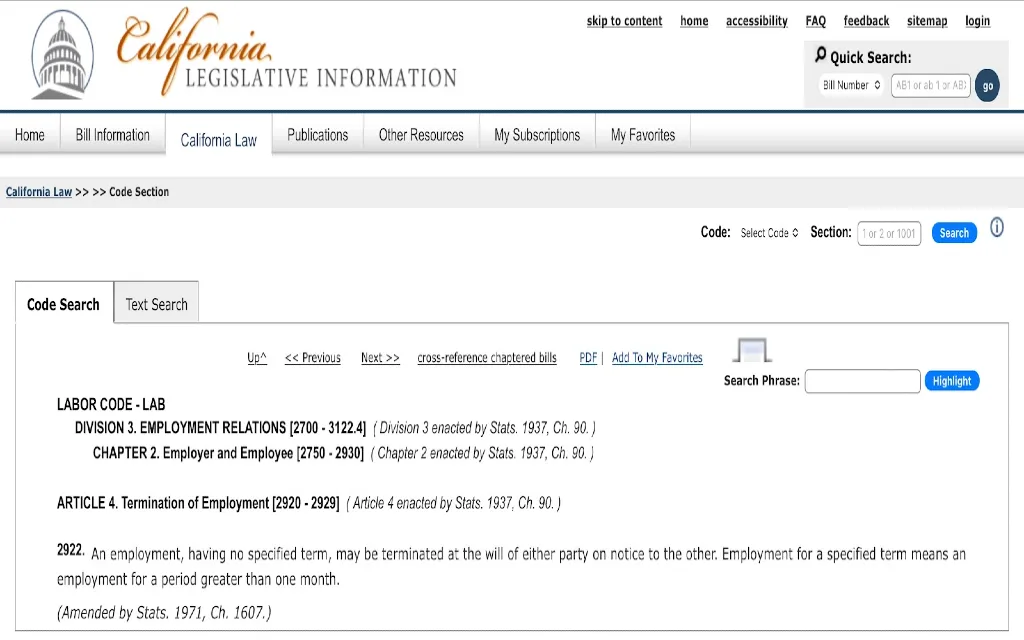
While there is a record of being fired in a person’s personnel file, that doesn’t necessarily mean it will show up on a background check. If it shows up on a screening depends on state laws, company policy, and the type of background check conducted.
Does Getting Fired Show Up on Background Checks? What Types of Background Checks Show Termination?
In most cases, getting fired from a position does not show up on routine background checks known as Level 1 check background checks. But there are other checks or methods that can reveal a person was fired.
Therefore, there are specific circumstances when being fired may come up, leading to questions about what led to the termination, and being honest when those questions arise can help the candidate move past termination into a new position at a new company.
A potential employer will usually appreciate an honest candidate over one who lied about getting fired.
Pre-Screening Questions
During the pre-screening or application process, a prospective employee may ask a candidate the reason why they left their last employer and the candidate should be truthful in their answer because termination from a previous job does not automatically disqualify someone from being hired.3
Employment Verification
Another type of background check that might uncover previous termination is the employment verification process, conducted by Human Resources managers or business owners to confirm information provided on resumes or applications matches the records of past employers. This is often a primary concern when considering whether being fired will be documented.
It’s crucial to distinguish employment verification checks from credit and criminal history screenings. While credit and criminal history checks can have positive or negative consequences, employment verification is considered neither positive nor negative. Therefore, there is no set time limit on how far back employment verification goes, whereas credit and criminal history can only go back seven to ten years.4
Licensure Screenings
For positions that require licensure or certification, background checks can reveal terminations and if a person loses their license in one of these positions, they will lose their job. This is vital information when conducting pre-employment screening, especially if the cause of termination was a lapse in licensing.
Even in the above situations, getting fired does not necessarily show up on a records check because of termination, and the reason for it is a gray area regarding when and how it shows up on a person’s record.
When Does Getting Fired From a Job Go on Your Record?
Getting fired from a job may go on a person’s record in a number of different ways. When it shows up depends on the person doing the search and the ones providing the information.
References
Most employers require anywhere from three to five references, both personal and professional ones. Some require references from former supervisors or managers. The reference may disclose a person away fired and the reason for the termination and it is good practice for a person to list at least three professional references on a resume.
Adding the wrong references to a resume or application can lead to accidental or intentional disclosure of the termination.
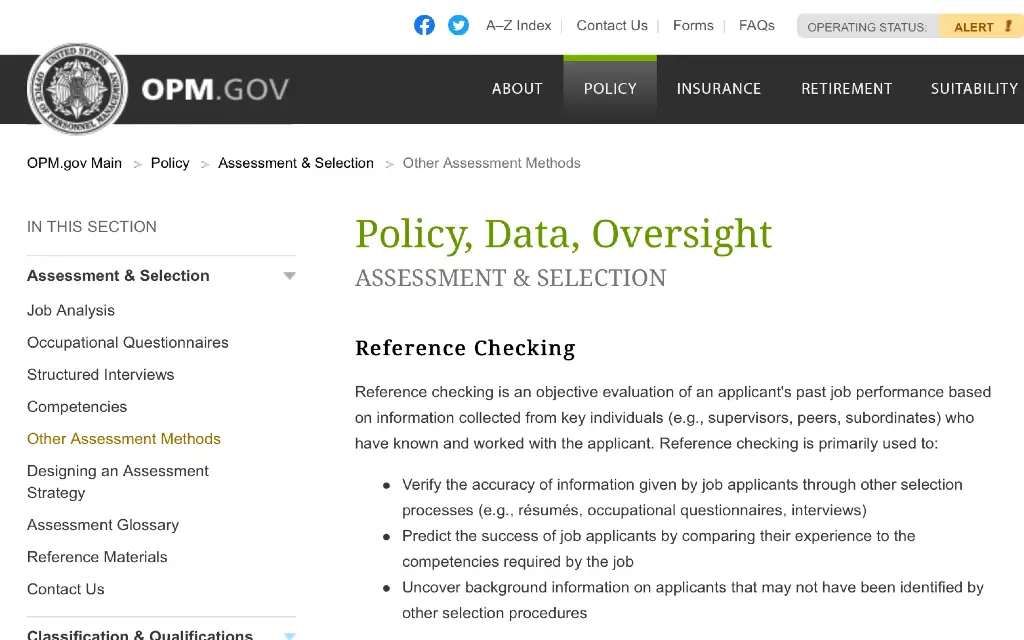
This is especially important when a person was terminated from a position. The termination could have been due to personality conflicts between the employer and employee rather than work performance.
Positive information from references (such as other prior employers or coworkers) can help minimize the potential damage a termination can have. In other words, qualified references can help the candidate look better even if the termination shows up on a background check.
Prior Employer or Manager
A person’s previous employer may also reveal a person was terminated when contacted to verify employment. When it comes to revealing why someone left a place of employment, state and federal laws do not prohibit a business from saying a person was terminated.
There are laws, however, against using the information about termination as an attempt to keep someone from finding another job (whether it’s in the same field or a different one). More about this will be addressed later on.
Gaps in Employment
Gaps in employment can mean many things, and sometimes it’s due to being terminated from a job. When a person is fired due to a criminal act on the job or from having to deal with the justice system for violations outside the workforce, a gap shows up on applications and resumes.
Employment gaps can raise suspicions or indicate changes in job status, although they do not necessarily indicate termination.
A prospective employer may make the connection that a person was fired when conducting a criminal background check if the dates of conviction and dates of employment gap line up.
While this is not a definite confirmation of being fired, it can be a strong indicator.
State Laws and Background Checks
Certain state laws allow disclosure of termination for some background checks, but there are limitations on what can be disclosed. These laws cover more than just blacklisting individuals as discussed above.
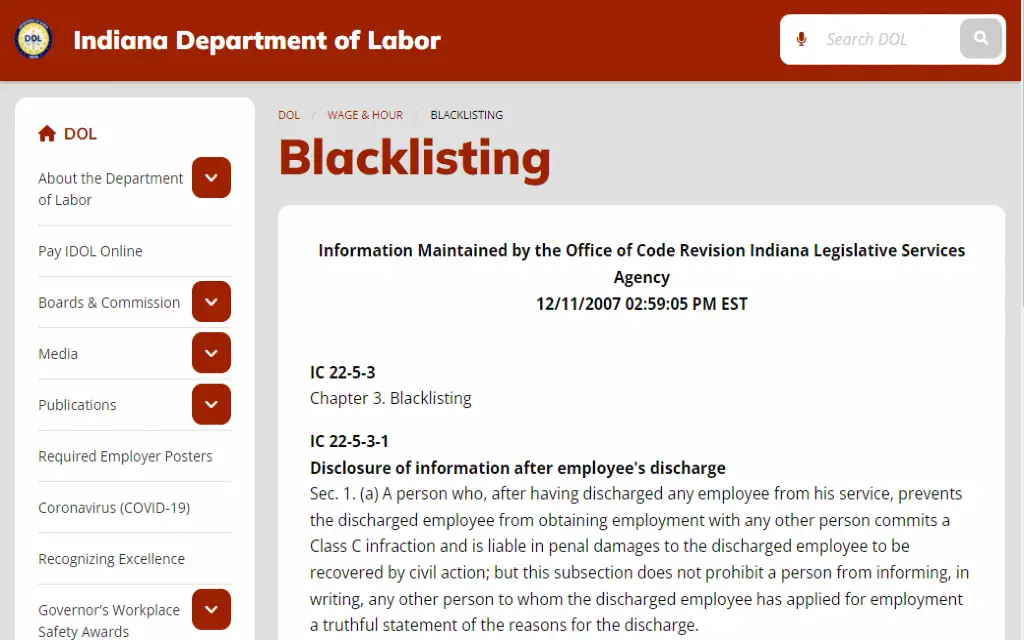
While only 29 states have anti-blacklisting laws, all 50 states have some kind of law regarding the disclosure of information during a background screening. An understanding of these laws can help prospective employees know if their rights are being violated.
State Laws About What Past Employers Can Reveal to Prospective Employers
Each state has a department or division of labor that works to protect the rights of employers and employees, set labor standards, and enforce state laws when violations occur.
In some states, the laws require employers to provide a discharged worker with a service letter outlining why they were fired and a bit about the person’s job and work history. The laws further compel the employer to be truthful to avoid any defamation lawsuits that can arise out of false or malicious information.
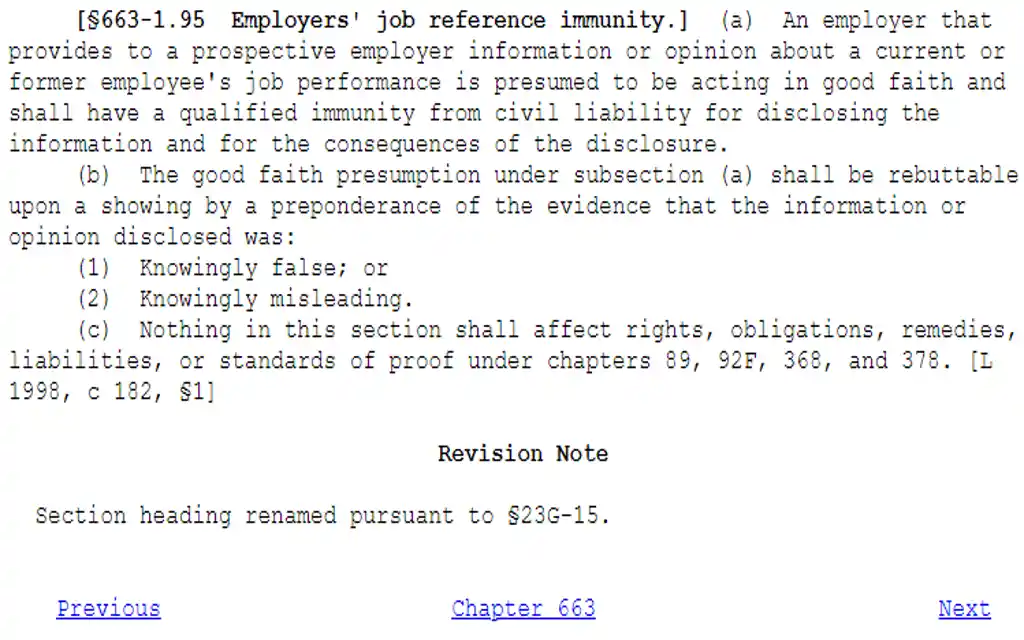
The table below outlines the employment laws in each state regarding termination, service letters, or permissible disclosure.
| State | Statute | What can be disclosed | Who can receive the information |
| Alabama | Alabama does not currently address this in legislative code outside an anti-blacklisting law (see table below). | ||
| Alaska | 95.65.160 | Performance on the job | Both the potential employer and the candidate |
| Arizona* | 23-1361 | Why the person was separated, performance on the job, job evaluations, professionalism, training, job skills | Both the potential employer and the candidate |
| Arkansas*+ | 11-13-0204 | Dates of employment, why the person was separated, rehire eligibility, performance on the job, attendance record, position description, any threats or acts of violence or harassment, the prior year’s drug or alcohol screening results | Both the potential employer and the candidate |
| California^ | Code 1055 | Why the person was separated, performance on the job, rehire eligibility, knowledge, and skills of individual | Potential employer |
| Colorado* | 8-2-0114 | Why person was separated, work-related habits, rehire eligibility, skills and abilities, performance on the job | Both the potential employer and the candidate |
| Connecticut | 31-51 | Can report anything job related as long as it is truthful or factual. | Both the potential employer and the candidate |
| Delaware*++^ | 19-708 and 19-709 | Performance evaluations, violations of laws. Special disclosure allowances for health care and child care employees including the reason for termination, position description, pay rate, employment start and end dates, and any disciplinary actions taken | Both the potential employer and the candidate |
| Florida*^ | 768.905 435.10 655.51 |
Why the person was separated and disciplinary actions (for employers that require background checks only). Banking further authorizes disclosure of financial violations | Both the potential employer and the candidate |
| Georgia* | 34-1-4 | Performance report, violations of state laws, skills and abilities | Both the potential employer and the candidate |
| Hawaii* | 63-1.95 | Performance evaluation | Potential employer |
| Idaho | 44-201 | Performance evaluation and conduct of a professional nature | N/A |
| Illinois* | 745 ILCS 46 | Performance on the job | Potential employer |
| Indiana*^ | 22-5-3-1 | Position description, why the person was terminated, and how long they were employed | Employee |
| Iowa* | 91B.2 | Any information that is work-related | Both the potential employer and the candidate |
| Kansas*^ | 44-119a | (Verbally) Position description, employment dates (In Writing) why the person was separated, performance evaluation | Both the potential employer and the candidate |
| Kentucky* | 411.225 | Performance evaluation and conduct on the job | Both the potential employer and the candidate |
| Louisiana* | 23-291 | Performance evaluation, skills, position description, work character, awards, discipline | Both the potential employer and the candidate |
| Maine*^ | 26-598 26-630 |
Performance evaluation and record of work | Potential employer |
| Maryland* | 5-423 | Why person was separated, performance on the job, any disclosure required by law | Both the potential employer and the candidate or any governmental authority (local, state or federal) |
| Massachusetts* | 111-72L 1/2 | Employment history (length, pay) and reason for separation | N/A |
| Michigan* | 423.452 423.506 423.507 |
Performance notes documented in the personnel record | Both the potential employer and the candidate |
| Minnesota*^ | 181.933 | Statute relates to immunity and written statement only | |
| Mississippi | Mississippi does not currently address this in the legislative code. | ||
| Missouri^ | 290.140 290.152 |
Position description, why person separated, employment dates | Both the potential employer and the candidate |
| Montana^ | 39-2-801 39-2-802 |
Why person was separated from employment | Potential employer |
| Nebraska^ | 48-209 48-211 |
Statutes relating to service letter requirements only | |
| Nevada^ | 613.210(4) | Statutes relating to service letter requirements only | |
| New Hampshire | New Hampshire does not currently address this in the legislative code | ||
| New Jersey | New Jersey does not currently address this in the legislative code | ||
| New Mexico* | 50-12-1 | Performance on the job | No restrictions on who can receive information |
| New York | New York does not currently address this in legislative code outside an anti-blacklisting law (see table below). | ||
| North Carolina* | 1-539.12 | Performance on the job, why the person was separated from employment, rehire eligibility, job skills | Both the potential employer and the candidate |
| North Dakota* | 34-02-18 | Employment dates, position description, performance on the job | Potential employer |
| Ohio* | 4113.71 | Performance on the job | Both the potential employer and the candidate |
| Oklahoma*+^ | Title 40, 61 and 171 | Performance on the job | Both the potential employer and the candidate |
| Oregon* | 30.178 | Performance on the job | Both the potential employer and the candidate |
| Pennsylvania* | 8340.1 | Performance on the job | Both the potential employer and the candidate |
| Rhode Island* | 28-6.4-1(c) | Performance on the job | Both the potential employer and the candidate |
| South Carolina*^ | 41-1-65 | Employment dates, a character on the job, why the person was separated, performance on the job, skills, position description, awards, disciplinary action | Both the potential employer and the candidate |
| South Dakota* | 60-4-10 | Performance on the job (in writing) | Both the potential employer and the candidate |
| Tennessee* | 50-1-105 | Performance on the job | Both the potential employer and the candidate |
| Texas*^ | 52.013(d) 103.001 to 103.003 Civil 5196 |
Why person was separated, performance on the job, job character | Both the potential employer and the candidate |
| Utah* | 34-42-1 | Performance on the job | Both the potential employer and the candidate |
| Vermont | Vermont does not currently address this in the legislative code | ||
| Virginia* | 80.1-46.1 | Performance on the job, why the person separated, performance evaluation, skills, position description, productivity on the job, awards or disciplinary actions, conduct on the job | Potential employer |
| Washington^ | 296-126-050 | Statutes relate to service letter requirement only | |
| West Virginia | 31A.4.44 | Applies to financial institutions only | |
| Wisconsin* | 134.02(2)(a) 895.478 |
Performance on the job, why the person was separated, job skills | Both the potential employer and the candidate or a bondsman/surety worker |
| Wyoming* | 27-1-113 | Performance on the job | Potential employer |
* Statute also contains an immunity clause
+Employer must obtain consent before disclosing information
++Only specified employees must provide written consent to the disclosure
^Employer required to write a separation letter or service letter under outlined conditions5
While most states have some laws regarding reference checks, only slightly more than half have anti-blacklisting laws.
State Regulations on Blacklisting (Is Termination Recorded in Every State?)
The act of using negative information to block someone from getting a new job is called “blacklisting.” There are laws against this in 29 states protecting individuals from this practice.
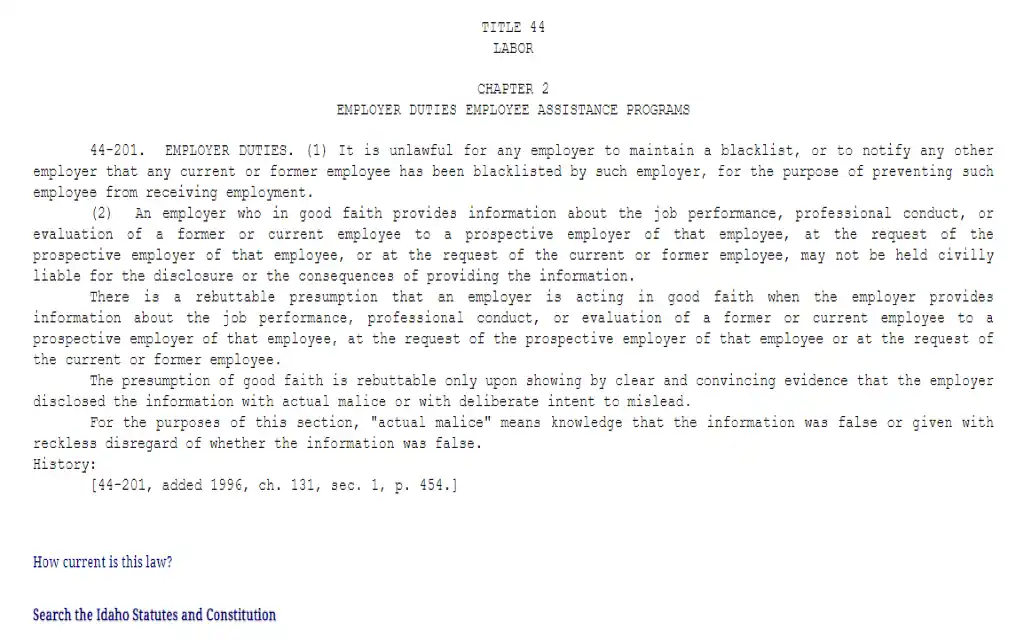
Below is a table detailing state anti-blacklisting statutes. It’s possible for termination to be recorded, but these laws prevent its malicious use.
| State | Statute | Prohibits |
| Alabama | 13A-11-123 | Anyone from maintaining a blacklist. (Misdemeanor Offense) |
| Arizona | 23-1361 to 23-1362 | Giving or receiving a blacklist is prohibited (Class 2 Misdemeanor) |
| Arkansas | 11-3-0202 | Giving or receiving a blacklist or verbally blacklisting someone (Misdemeanor Offense) |
| California | 1050 to 1053 | Giving false statements with intent to block future employment and failure to take steps to prevent blacklisting (Misdemeanor Offense) |
| Colorado | 8-2-110 to 8-2-114 | Prospective employer telling another that a candidate has been blacklisted (Misdemeanor Offense) |
| Connecticut | 31-51 | Blacklisting an employee or publishing a blacklist or conspiracy to prevent someone from gaining employment (Carries a fine if violated) |
| Florida | 448.045 | Conspiring to get someone fired or prevent someone from being hired or making threats (in writing or verbal) to get someone fired or prevent them from being hired (Misdemeanor Offense) |
| Hawaii | 377-6(11) | Creating or disseminating a blacklist |
| Idaho | 44-201 | Maintaining a blacklist |
| Indiana | 22-5-3-1 | Using any methods to keep someone from securing gainful employment (Class C Infraction) |
| Iowa | 730.2 | Allowing a blacklist or using any means to keep someone from gainful employment (Serious Misdemeanor, Treble Damages to Victim) |
| Kansas | 44-117 to 44-119 | Using means to prevent someone from gainful employment (Misdemeanor Offense) |
| Maine | 17-401 | Maintaining or contributing to a blacklist (Class D Crime) |
| Massachusetts | 149-19 | Intimidating or using force to keep someone from employment |
| Minnesota | 179.6 | Blacklisting terminated employees, using a blacklist to get someone fired (Misdemeanor Offense) |
| Montana | 39-2-802 to 39-2-804 | Blacklisting someone verbally or in writing (Misdemeanor Offense) |
| Nevada | 613.21 | Blacklisting someone or conspiring to prevent someone from gainful employment (Misdemeanor Offense) |
| New Mexico | 30-13-3 | Keeping someone from getting gainful employment (Misdemeanor Offense) |
| New York | 704(2) and 704(9) | Creating or disseminating a blacklist |
| North Carolina | 14-355 | Blacklisting a worker who has been discharged with the purpose of preventing gainful employment (Class 3 Misdemeanor) |
| North Dakota | 34-01-06 | Intentionally and with malice working to prevent someone from gainful employment (Class A Misdemeanor) |
| Oklahoma | 40-172 | Blacklisting someone, maintaining a blacklist, or requiring a letter or resignation with intent to blacklist someone (Subject to a fine for violation) |
| Oregon | 659.805 | Blacklisting someone or conspiring to prevent gainful employment of another (Subject to a fine for violation) |
| Rhode Island | 28-7-13(2) | Creating or distributing a blacklist to prevent employment or due to a person’s lawful participation in a labor union |
| Texas | 52.031 | Preventing another from getting gainful employment or receiving a blacklist from another with intent to prevent employment (Misdemeanor Offense) |
| Utah | 34-34-02 | Interfering with the person’s right to work (Misdemeanor Offense) |
| Virginia | 41.1-27 | Blacklisting someone willfully and with malicious intent (Misdemeanor Offense) |
| Washington | 49.44.101 | Giving or receiving a blacklist or actively blacklisting someone (Misdemeanor Offense) |
| Wisconsin | 134.02 | Blacklisting or attempting to blacklist an employee or allowing another to blacklist an employee (Subject to a fine for violation) |
Federal Laws
While there are no federal laws regarding what can be disclosed on employment verification, there are laws limiting what can be done with the information received. The Fair Credit Reporting Act (FCRA)6 and Equal Employment Opportunity laws (EEOC) protect individuals from discrimination based on background check information.7
The United States Department of Labor provides best practices for public and private businesses or agencies to include employee rights. This guidance helps employers hire right and protect the company and the candidate.8
How Long Does a Termination or Being Fired Stay on Your Record?
A person’s resume or employment history goes back to the date of their first job, which means terminations can stay on a record indefinitely. The standard look back is seven to ten years similar to the checks for criminal history and a credit background check for most states. Some companies apply this time frame to employment verifications as well.
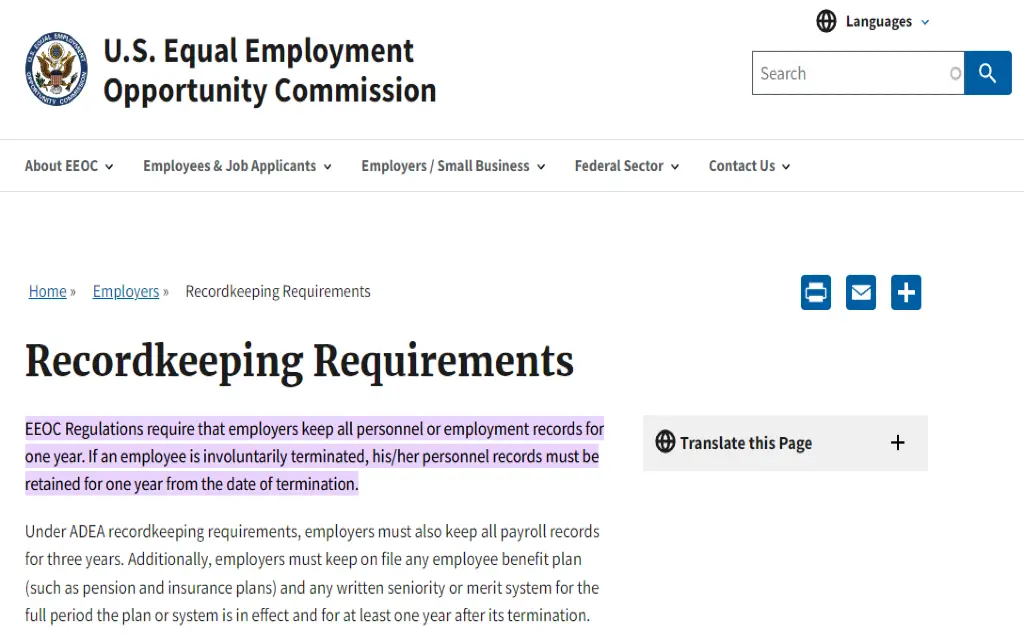
Most third-party sites also use the seven to ten-year standard unless the employer requests a longer look-back period. While a longer look-back period can give a better picture of the candidate’s skills, abilities, and work character, sometimes a shorter time frame better suits the employer’s needs.
Laws regarding the look-back check for employment verification focus more on the content of the information rather than its age of it. Therefore, termination information will not be disclosed when it violates state law.
Other limitations that can be placed on disclosing termination are based on seeking criminal or civil remedies against the person who violates disclosure statutes. The state can file criminal charges and the affected person can file a lawsuit in civil court for damages.
If You Get Fired for Petty Theft, Does it Go on Your Record?
Getting a charge of petty theft does go on a person’s criminal record, but whether or not it shows up on employment verification as a termination depends on when and where the petty theft occurred, and whether or not the laws in the state let the prior employer discuss the petty theft.
Even in states that do not allow employers to reveal when a person was fired for stealing at the company, a person conducting a background check aligns the dates on the charge for the theft with the date the person separated from the company and makes a guess the two are related.
Does Being Terminated for Gross Misconduct Go On Your Record?
Being terminated for gross misconduct can go on a person’s record; however, disclosure is regulated by state law like other types of information. Idaho, Kentucky, and Virginia employment history statutes allow disclosure of on-the-job conduct to potential employees. In these states, it is possible for an employer to learn of a candidate’s gross misconduct.
If the gross misconduct includes violations of criminal statutes, these violations can appear on a person’s criminal history which can be discovered during a routine background check. An example of gross misconduct could be a conviction for the felony charge of manslaughter following a motor vehicle accident in a company vehicle.
A pre-employment screening can reveal a range of information, but state laws often restrict what can be disclosed. Getting fired doesn’t necessarily have to derail your career. In certain states, terminations may be documented, addressing concerns about its impact on your record.
References
1 Job Openings and Labor Turnover Summary – 2022 M05 Results. (n.d.). Bureau of Labor Statistics. Retrieved July 31, 2022, from <https://www.bls.gov/news.release/jolts.nr0.htm>
2 What States Are At-Will? List of At-Will Employment States. (n.d.). Rocket Lawyer. Retrieved July 31, 2022, from <https://www.rocketlawyer.com/business-and-contracts/employers-and-hr/recruiting-and-hiring/legal-guide/what-states-are-at-will-employment-states>
3 How to Explain Termination on a Job Application. (n.d.). Indeed. Retrieved July 31, 2022, from <https://www.indeed.com/career-advice/finding-a-job/how-to-explain-termination-on-job-application>
4 Advisory Opinion to Nadell (12-10-98). (n.d.). Federal Trade Commission. Retrieved July 31, 2022, from <https://www.ftc.gov/legal-library/browse/advisory-opinions/advisory-opinion-nadell-12-10-98>
5 Repa, B. K. (n.d.). State Laws on References and Statements By Former Employers. Nolo. Retrieved July 31, 2022, from <https://www.nolo.com/legal-encyclopedia/free-books/employee-rights-book/chapter9-6.html?pathUI=button>
6 What Employment Background Screening Companies Need to Know About the Fair Credit Reporting Act. (2016, April 14). Federal Trade Commission. Retrieved July 31, 2022, from <https://www.ftc.gov/business-guidance/resources/what-employment-background-screening-companies-need-know-about-fair-credit-reporting-act>
7 Employers | U.S. (n.d.). Equal Employment Opportunity Commission. Retrieved July 31, 2022, from <https://www.eeoc.gov/employers>
8 Summary of the Major Laws of the Department of Labor. (n.d.). U.S. Department of Labor. Retrieved July 31, 2022, from <https://www.dol.gov/general/aboutdol/majorlaws#empprotection>

